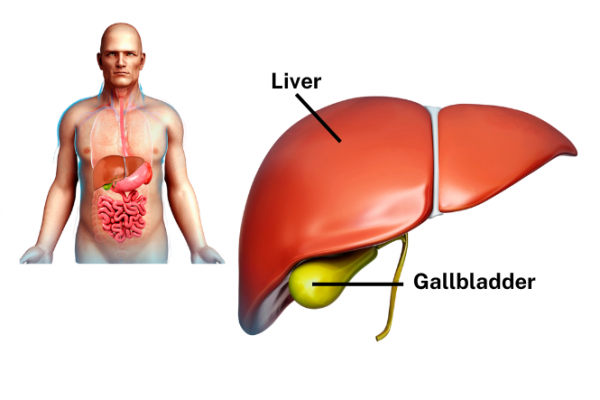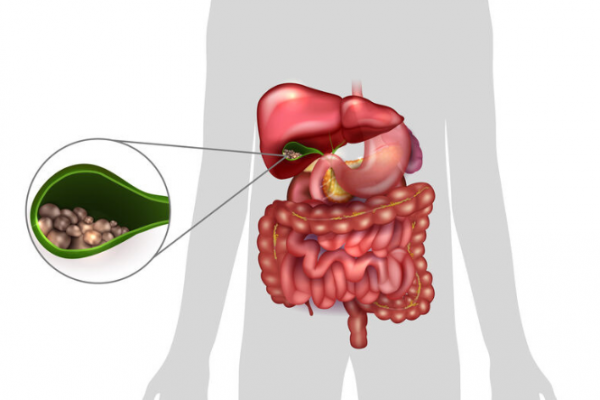If you're a frequent visitor to Healthify, why not share our site with a friend? Don't forget you can also browse Healthify without using your phone data.
Gallstones | Kōwhatu kouawai
Key points about gallstones (kōwhatu kouawai)
- Gallstones are stones that form in the gallbladder from a digestive fluid called bile.
- Gallstones can range in size from a grain of sand to a golf ball.
- They are common, particularly in women. After the age of 40, more than 2 in 10 women and 1 in 10 men have gallstones.
- Most people don't know they have them as they have no symptoms.
- If gallstones block the gallbladder they can cause sudden abdominal (tummy or puku) pain.
- Gallstones are usually only treated if they cause pain.

The gallbladder is part of your digestive system. It's a small, pear-shaped sac that sits underneath your liver. It stores and concentrates bile, a greenish-yellow fluid made in your liver. Bile helps to digest fats in the food you eat.

Image credit: Canva
Gallstones develop when bile becomes too concentrated in your gallbladder. Substances in bile clump together to form 'stones' which can range in size from small crystals to the size of a golf ball
When gallstones stay in your gallbladder, the condition is called cholelithiasis. When they enter the main outlet (bile duct), the condition is called choledocholithiasis. If they're blocking a duct you will probably need treatment.
Types of gallstones
Cholesterol stones are the most common type, making up at least 75% of all gallstones. They can occur if your liver produces too much cholesterol which causes too much cholesterol in your bile.
Pigment stones are less common. They are small and dark brown or black in colour and tend to occur in people with other types of stomach or blood disorders.
The image below shows a collection of stones in the gallbladder.

Image credit: 123rf
About 1 in 10 New Zealanders have gallstones, although most people won't get any symptoms.
People at greater risk of gallstones
- Women are twice as likely as men to have gallstones between the ages of 20 and 60 years.
- Pregnant women.
- Women using the contraceptive pill or menopausal hormone therapy.
- Increasing age – about 15 out of every 100 older people have gallstones.
- Overweight or obese people, due to the increased cholesterol made by their liver.
- People who lose weight rapidly because burning fat stores causes your liver to secrete extra cholesterol into your bile.
- People with a family history of gallstones.
A gallstone attack can happen at any time but it's more likely to occur after eating a fatty meal. Gallstone attacks can range from pain that happens now-and-again, causing a ‘grumbling’ discomfort to unbearably painful attacks that can last for hours. The most common symptom is an attack of pain in the upper right part of your belly, or your back, known as biliary colic.
Symptoms of gallstones can include the following:
- Pain – constant, severe pain in the upper right section of your stomach that may be felt through to your back between the shoulder blades. It can also occur centrally in your upper abdomen or behind your breastbone, copying a heart attack. The pain increases quickly and may last from 15 minutes to several hours before easing.
- Nausea (feeling sick) and vomiting (being sick).
- Indigestion, flatulence (wind) or general discomfort in your tummy.
- Not being able to eat fatty foods.
Gallstones sometimes require immediate attention
Serious symptoms of gallstones that require immediate attention include:
- fever, sweating and chills
- persistent vomiting where you can't eat or drink, leading to dehydration
- jaundice – a yellowing of your skin or whites of your eyes.
Fever may be an indication of infection or inflammation of your gallbladder or your pancreas. The pancreas is a nearby digestive gland that produces insulin and digestive enzymes. Jaundice occurs when the main bile duct becomes blocked, leading to the build-up of a substance called bilirubin in the bloodstream.
Several other conditions can cause symptoms similar to gallstones, so it's important that you seek advice from your healthcare provider to rule out other causes (eg, cardiac disease, indigestion, hepatitis, irritable bowel syndrome or gastric ulcers).
Silent gallstones
In most cases, gallstones don’t cause any problems, and 7 out of 10 people have no symptoms. These gallstones are often only discovered by chance during investigations of other problems. For this reason, they are sometimes called ‘silent’ gallstones.
- If you are found to have silent gallstones you should avoid fatty meals.
- It's not likely you'll require surgery unless you develop symptoms or pain.
- It's important to weigh up the risk, expense and discomfort of having your gallbladder removed (called a cholecystectomy) against the fact that the stones may never cause you any discomfort or illness.
The type of tests used to diagnose gallstones depends on the situation.
Blood tests may be used to check for infection, jaundice or blockage in the bile ducts.
Ultrasound is the most common test used to check for gallstones. It's quick and painless and uses high-frequency sound waves to create pictures of the gallbladder, bile duct, and their contents. Read more about ultrasound.
Magnetic resonance cholangiopancreatography (MRCP) is an MRI scan to form a picture of the bile ducts and pancreatic ducts to look for narrowings. This is done to clarify the diagnosis prior to consideration of an ERCP (see below) if there is any doubt, or if an ERCP is considered high risk.
Endoscopic retrograde cholangiopancreatography (ERCP) is an investigation your healthcare provider may request if they suspect a gallstone may be lodged in the main bile duct and can't be seen using ultrasound. This procedure involves looking at the bile duct through a flexible tube with a camera on the end (called an endoscope) which is inserted into your mouth and directed carefully through your oesophagus (food tube) and stomach. It is then passed into the first part of your intestine, called the duodenum, where the opening of the bile duct can be seen. A dye is injected through the tube into the bile duct to check for blockages.
Sometimes, a sphincterotomy is carried out during the ERCP. This involves passing an instrument through the endoscope and making a small cut in the lower part of the bile duct. You shouldn't be able to feel the cut. This should allow the surgeon to remove any stones, catching them in a tiny basket.
Gallstones aren't usually treated unless you have symptoms. Your healthcare provider will give you medicine for pain, nausea, and vomiting. You may be told to drink only clear liquids for a few days to give your gallbladder a rest. You should also avoid fatty or greasy foods. If you're in a lot of pain, you may be admitted to the hospital so you can get intravenous fluids (through your veins), pain medicine and antibiotics.
Wait-and-see approach
About 3 in 10 people who get biliary colic won't get another attack. This is because the stone dissolves or becomes dislodged on its own. Because of this, your healthcare provider may advise a wait-and-see approach. If so, there are a number of things you can do to reduce the chance of having more gallstone attacks. For example:
- Eat a healthy balanced diet with plenty of fruit and vegetables.
- Start a slow weight loss until you reach a healthy weight (avoid crash diets).
- Drink plenty of fluids to keep hydrated.
- Limit the amount of caffeine and alcohol you consume.
- Keep a diary of food and symptoms to help you identify “trigger foods”.
- Avoid fatty foods and excess oils when cooking as these make the gallbladder squeeze and can bring on a painful attack.
You may find it useful to look at some Nutrition, exercise and weight management apps.
Surgery
An operation to remove the gallbladder is called cholecystectomy and is the most common way of treating gallstones. You can live a healthy life without your gallbladder. Read about gallbladder removal surgery.
Diet
Some people find eating a low-fat diet controls their symptoms of gallstones. However, if you have a fever, constant nausea or vomiting, or if you have jaundice (yellow eyes or skin), seek medical attention.
Home remedies
Remedies are advertised on the internet as being able to ‘cure’ or ‘pass’ gallstones. These usually involve drinking large amounts of oil and lemon juice. They don't work. Any apparent ‘success’ is because the symptoms from gallstones can be very rare, leading to the belief that a ‘cure’ has been achieved – until the next attack of pain.
Apps
Nutrition, exercise and weight management apps
Brochures
Gallstones(external link) Gastroenterology Society of Australia
References
- Biliary colic and complications from gallstones(external link) BPAC, NZ, 2014
- Symptoms and causes of gallstones(external link) National Institute of Diabetes and Digestive and Kidney Diseases, US, 2017
- Gallstones(external link) NHS Inform, UK, 2023
- Gallstones(external link) Gastroenterology Society of Australia, 2021
Guidelines
Biliary colic and complications from gallstones(external link) BPAC, NZ, 2014
Gallstone disease diagnosis and management(external link) NICE Guidelines, UK 2015
Clinical resources
Telehealth clinical module – abdominal assessment(external link) ProCare, NZ, 2022
Apps
Credits: Healthify editorial team. Healthify is brought to you by Health Navigator Charitable Trust.
Reviewed by: Dr Art Nahill, Consultant General Physician and Clinical Educator.
Last reviewed:





